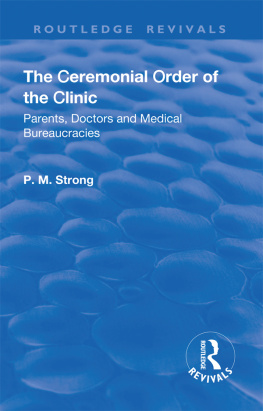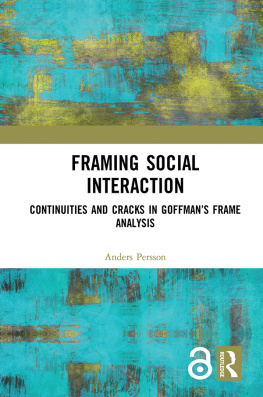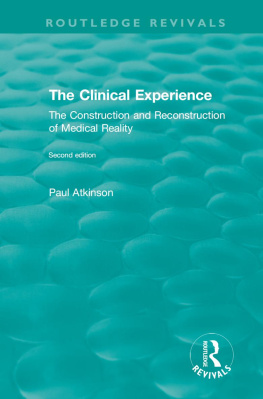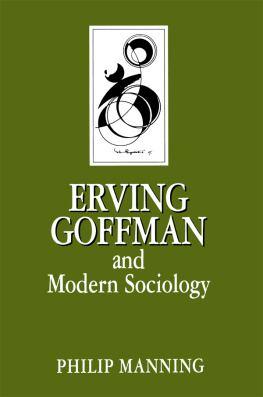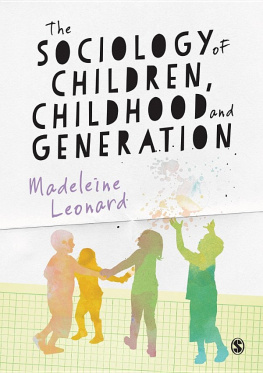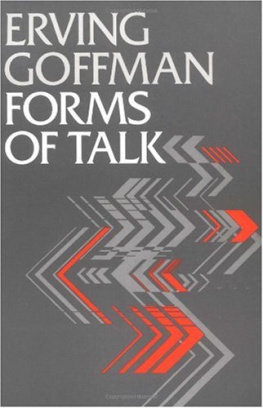The ceremonial order of the clinic
International Library of Sociology
Founded by Karl Mannheim
Editor: John Rex, University of Warwick
A catalogue of the books available in the International Library of Sociology and other series of Social Science books published by Routledge & Kegan Paul will be found at the end of this volume.
First published 1979 by Routledge and Kegan Paul Ltd.
Reissued 2018 by Routledge
2 Park Square, Milton Park, Abingdon, Oxon OX14 4RN
711 Third Avenue, New York, NY 10017, USA
Routledge is an imprint of the Taylor & Francis Group, an informa business
Copyright P. M. Strong 1979
All rights reserved. No part of this book may be reprinted or reproduced or utilised in any form or by any electronic, mechanical, or other means, now known or hereafter invented, including photocopying and recording, or in any information storage or retrieval system, without permission in writing from the publishers.
Notice:
Product or corporate names may be trademarks or registered trademarks, and are used only for identification and explanation without intent to infringe.
Publishers Note
The publisher has gone to great lengths to ensure the quality of this reprint but points out that some imperfections in the original copies may be apparent.
Disclaimer
The publisher has made every effort to trace copyright holders and welcomes correspondence from those they have been unable to contact.
A Library of Congress record exists under LC control number: 2001022936
ISBN 13: 978-1-138-73548-4 (hbk)
ISBN 13: 978-1-315-18650-4 (ebk)
To the memory of my father
Contents
- ii
- A-1
- A-2
- A-3
- A-4
- A-5
- A-6
- A-7
- A-8
- A-9
- A-10
- A-11
- A-12
- A-13
- A-14
- A-15
- A-16
Guide
This is a book about the meetings that doctors have with parents when a child is sick or needs medical inspection. (Here and there therapists too will make an appearance.) It says nothing about the medicine involved in all this and very little about peoples feelings, opinions or perceptions. These things are interesting but they are not my interest here. My concern is with ceremonies: with the social form of the occasion and the sorts of identity tacitly claimed by each party and conferred upon the other.
One way of seeing it is as a study of the doctor-patient relationship. Of course parents are not patients, meetings are not the only part of a relationship, and doctors can meet with patients in a variety of ways, not just one. All of these qualifications will get a mention. Nevertheless, the phrase is worth hanging on to until something more precise if rather more academic appears later on.
Research always takes place somewhere, so these are particular meetings between doctors and parents circumscribed by time and place. Most of them occur or occurred in a Scottish city over three and a half years in the 1970s; the rest took place over three weeks in an American city of much the same size. Narrower still and three weeks seems narrow enough these are primarily meetings in the outpatient (or ambulatory) clinics of two hospitals, though a few other kinds of encounter are mentioned.
So now my title seems grandiose and even the sub-title is inflated. (Would Three Weeks in Another Town be better?) Nevertheless there may be something in this exaggeration, though justification will have to wait.
Sticking to the meetings and I shall do this most of the time the point of my description is this: here are over a thousand separate occasions on which parents met doctors and met them in all kinds of different circumstances, and yet the manner of their meeting, the ceremonial order of the occasion, was pretty much the same no matter how other things might vary. One can go further. The outward form of their relationship took just the one shape, give or take a few minor alterations, in all of the Scottish consultations and in most of the American ones too.
So here we have something fairly powerful, a manner of meeting, a mode of being doctor or parent, which was used across a great range of contingencies and particularities; this mode the bureaucratic format is my main topic and I shall try to describe its nature, its origins, the methods by which it was sustained and the actual fit between this outward show and the matters which it clothed.
In doing all this I have several aims, some modest, others less so. One is to comment on medical work with children and their parents, another is to reflect more generally on medical consultations, for although paediatrics is one small segment of the clinical world its methods and dilemmas may well have their counterparts in other areas of medicine. There may also be something for sociologists. Medical consultations are merely one in a myriad of those occasions and events which sociologists study, and the frames or formats used therein may be of little interest save to specialists in the field of service relationships. Nevertheless, since the master of ceremony, Erving Goffman himself, has paid little attention to the study of any one order, the careful delineation of a form may still have something to say about formats in general and the structures which shape our daily lives.
Unlike most modern products, sociology is normally presented as the work of named individuals. Washing-machines and cars may come to us with the names of their makers attached, but we know that this is the name of an organization, not of an individual. Our own machine is merely one of thousands like it, in whose production thousands are typically engaged. Further, the manner in which this work-force is best co-ordinated is a topic of constant public and theoretical concern. Sociology, however, is often seen, even by its members, as a craft where the quality of any individual piece of manufacture is predominantly fixed by the skills of the craftsmen and the intellectual tools with which he or she works. It is to these features and not to the organization of the craft that attention is typically directed. We focus on the paradigm involved, which itself can hardly be said to produce things, and on the specific arguments, which are seen as representing the qualities of the individual worker.
Moreover, even if we do inquire into the way this piece of research came to be undertaken or that article written, we experience great difficulty. For such information is rarely given to us. We are presented merely with a finished product whose most striking clue to its production is the name of the author(s). The nearest that we normally get to discovering the conditions under which this product originated is a brief section, such as this, called acknowledgments1 and the address of an institution in small print on the fly-leaf. Occasionally a book may be found to be part of a series of such works, all carried out at a particular institution. But such information gives no clue as to how the work came into being. The main focus still rests upon the author.
Such neglect is fostered by the craft nature of the discipline. Not only do we see authorship in others work but we experience it in our own. For, as members of a cottage industry, we are typically in control of some important aspects of our own production. We can often determine the topic, the rate at which we work and the occasions of our labour. Such personal control, particularly when contrasted with its absence in many other kinds of work, can conceal some of the important constraints that bind us. Although we can often exercise some choice as to what we will produce, in practice almost all of us have to choose from a very limited range of topics because of the conditions of our employment as teachers or researchers. Teachers find it hard to do field-work while researchers, though they are certainly allowed, even pushed into the field, often have little choice as to the specific pasture or how long and in what fashion they may graze.

